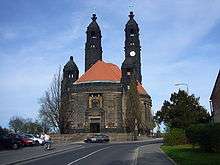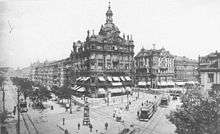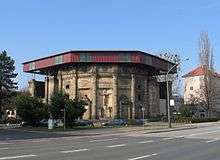Schilling & Graebner
Schilling & Graebner was founded by the architects Rudolf Schilling (1859–1933) and Julius Graebner (1858–1917) in Dresden in 1889. Over the years Schilling & Graebner changed their style repeatedly. Starting with historistic buildings they became especially known as leading German architects of Art Nouveau and Modernity. Their presumably most important building is the church Christuskirche in Strehlen (1903-1905). This landmark of Dresden marks the transition of sacral architecture in Germany from historicism to modernity.

Beside such important works like the town hall of Pieschen (Renaissance Revival architecture, 1891), Dresden's former most impressive business premises Kaiserpalast (Baroque Revival architecture, 1896, destroyed 1945), and an obelisk in front of Dresden castle on occasion of the 800th anniversary of the House of Wettin in 1896, Schilling & Graebner were especially engaged in building of Protestant churches, in Dresden but also in small towns. The Lutherkirche Radebeul was built in 1891 (Renaissance Revival architecture) and the interior of the Kreuzkirche was re-designed from 1897 to 1900 (Art Nouveau), after a fire had destroyed it. Graebner was member of the directorate of the Dürerbund. As members of Deutscher Werkbund[1] Schilling and Graebner designed many of their later villas, public and sacral buildings according to the principles of modernity as propagated by the Werkbund. The former Zionskirche, built 1908-1912 and destroyed in 1945, was an extraordinary example of this architectural style.
 Town hall Pieschen.
Town hall Pieschen. Kaiserpalast Dresden.
Kaiserpalast Dresden. Lutherkirche Radebeul.
Lutherkirche Radebeul. Ruin of the church Zionskirche.
Ruin of the church Zionskirche.
After Graebner's death his son joined the office. It had to be finally closed in 1947.
Further reading
- Ricarda Kube: Schilling und Graebner (1889–1917) – Das Werk einer Dresdner Architektenfirma. Dissertation an der Technischen Universität Dresden, 2 Bände, 1988.
- Landkirchen. Entworfen und ausgeführt von den Architekten Schilling & Graebner. Mit einem Geleitwort von Dr. Paul Schumann. Leipzig, Gilbertsche Verlagsbuchhandlung, 1903.
- Guy Eglinton, Peyton Boswell: International studio, Vol. 13. New York Offices of the International Studio, 1901, pp. 283, 284.
- Ralph Adams Cram: Christian art: an illustrated monthly magazine devoted to current church building, American and foreign, and the allied ecclesiological arts, with expert discussions of all topics relating to Christian archaeology, Vol. 4. R.S. Badger, 1908, pp 14–18.
References
External links
| Wikimedia Commons has media related to Schilling & Graebner. |